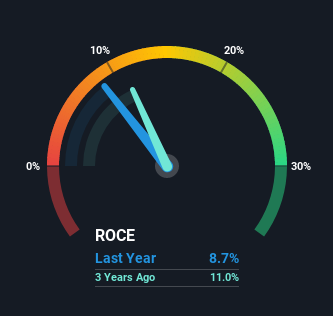
Finding a business that has the potential to grow substantially is not easy, but it is possible if we look at a few key financial metrics. In a perfect world, we'd like to see a company investing more capital into its business and ideally the returns earned from that capital are also increasing. If you see this, it typically means it's a company with a great business model and plenty of profitable reinvestment opportunities. In light of that, when we looked at Almarai (TADAWUL:2280) and its ROCE trend, we weren't exactly thrilled.
Return On Capital Employed (ROCE): What is it?
If you haven't worked with ROCE before, it measures the 'return' (pre-tax profit) a company generates from capital employed in its business. Analysts use this formula to calculate it for Almarai:
Return on Capital Employed = Earnings Before Interest and Tax (EBIT) ÷ (Total Assets - Current Liabilities)
0.087 = ر.س2.2b ÷ (ر.س32b - ر.س6.6b) (Based on the trailing twelve months to September 2021).
So, Almarai has an ROCE of 8.7%. On its own, that's a low figure but it's around the 11% average generated by the Food industry.
See our latest analysis for Almarai

Above you can see how the current ROCE for Almarai compares to its prior returns on capital, but there's only so much you can tell from the past. If you'd like, you can check out the forecasts from the analysts covering Almarai here for free.
How Are Returns Trending?
Over the past five years, Almarai's ROCE and capital employed have both remained mostly flat. This tells us the company isn't reinvesting in itself, so it's plausible that it's past the growth phase. So don't be surprised if Almarai doesn't end up being a multi-bagger in a few years time. On top of that you'll notice that Almarai has been paying out a large portion (65%) of earnings in the form of dividends to shareholders. These mature businesses typically have reliable earnings and not many places to reinvest them, so the next best option is to put the earnings into shareholders pockets.
Our Take On Almarai's ROCE
We can conclude that in regards to Almarai's returns on capital employed and the trends, there isn't much change to report on. Additionally, the stock's total return to shareholders over the last five years has been flat, which isn't too surprising. Therefore based on the analysis done in this article, we don't think Almarai has the makings of a multi-bagger.
On a separate note, we've found 1 warning sign for Almarai you'll probably want to know about.
While Almarai may not currently earn the highest returns, we've compiled a list of companies that currently earn more than 25% return on equity. Check out this free list here.
New: Manage All Your Stock Portfolios in One Place
We've created the ultimate portfolio companion for stock investors, and it's free.
• Connect an unlimited number of Portfolios and see your total in one currency
• Be alerted to new Warning Signs or Risks via email or mobile
• Track the Fair Value of your stocks
Have feedback on this article? Concerned about the content? Get in touch with us directly. Alternatively, email editorial-team (at) simplywallst.com.
This article by Simply Wall St is general in nature. We provide commentary based on historical data and analyst forecasts only using an unbiased methodology and our articles are not intended to be financial advice. It does not constitute a recommendation to buy or sell any stock, and does not take account of your objectives, or your financial situation. We aim to bring you long-term focused analysis driven by fundamental data. Note that our analysis may not factor in the latest price-sensitive company announcements or qualitative material. Simply Wall St has no position in any stocks mentioned.
About SASE:2280
Almarai
Operates as an integrated consumer food and beverage company in Saudi Arabia, Egypt, Jordan, and other Gulf Cooperation Council countries.
Established dividend payer with proven track record.

